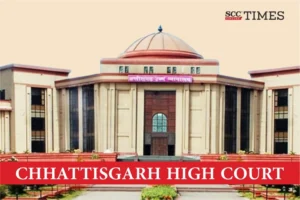Chhattisgarh High Court: In a criminal appeal filed by a husband convicted and sentenced under Sections 3761, 377, and 3042 of the Penal Code, 1860 (‘IPC’) for the rape and subsequent death of his wife, the Single Judge Bench of Narendra Kumar Vyas, J., allowed the appeal holding that no offence under Sections 376 and 377 could be committed between a husband and wife, and the impugned order of conviction suffered from perversity as the Trial Court provided no finding as to how the offence under Section 304 was made out.
Background
On the night of the incident, the convict-husband committed unnatural sex with the deceased wife against her will. The husband inserted his hand in the anus of the deceased, due to which she complained of pain, and subsequently, was admitted to a hospital for treatment, an FIR was registered under Section 377 IPC, and the husband was arrested. The deceased eventually succumbed to her injuries, so an offence under Section 304 IPC was also added, and the husband was arrested.
During the trial, the Executive Magistrate who recorded the dying declaration stated that though the deceased informed him that her husband had forcefully committed an unnatural sexual act with her, the same was not mentioned in the dying declaration. Additionally, the post-mortem stated that the cause of death was peritonitis and rectal perforation.
Relying upon the dying declaration, the Trial Court held that the deceased became ill due to a forceful physical relationship with her husband and convicted the husband under Sections 377, 376, and 304 IPC and sentenced him to rigorous imprisonment of 10 years and a total fine of Rs 3000. Aggrieved, the husband filed the present appeal.
Issues and Decision
1. Whether offence under Sections 376 and 377 IPC was attracted in the present facts and circumstances of the case when the accused and the victim are married.
The Court stated that from a perusal of Sections 3753, 376, and 377 IPC it was clear that no offence under Section 375 could be committed between a husband and wife under Exception 2, even in the absence of consent. The Court stated that it was clear that the definition of rape as provided under Section 375 included penetration of penis in the parts of the body i.e., vagina, urethra or anus of a woman for which consent was not required, if it was committed by a husband on a wife above the age of 15 years. Thus, unnatural sex could not be considered an unnatural offence between husband and wife, as such apparently, there was repugnancy in these two situations in the light of definition of rape under Section 375 and unnatural offence of Section 377. The Court added in Navtej Singh Johar v. Union of India (2018) 10 SCC 1, the Supreme Court had interpreted unnatural sex to include oral and anal sex, which were not offences if done consensually. Since the relationship of a husband and wife was an exception to the offence of rape, which included anal penetration, as consent was not required, any unnatural sex between husband and wife could not be treated as an unnatural offence under Section 377.
Thus, the Court held that the offences under Sections 376 and 377 IPC were not made out against the accused.
2. Whether, in the present facts and circumstances of the case, the offence under Section 304 IPC was attracted, and conviction under Section 304 was sustainable.
The Court stated that upon scrutiny of the dying declaration, the same could not be found to be sufficient for recording the conviction as there was no corroboration from other evidence, and as such, there was doubt over the correctness of the dying declaration. In this regard, the Court placed reliance on Naeem v. State of U.P. 2024 SCC OnLine SC 237, wherein the Supreme Court provided factors to be considered while resting conviction solely on the dying declaration.
Regarding Section 304 IPC, the Court noted that the Trial Court did not record any finding as to how the offence under Section 304 was attracted and proved by the prosecution. Thus, the order suffered from perversity and patent illegality, which deserved to be interfered with under Section 3864 of the Code of Criminal Procedure, 1973. Accordingly, the Court held that the accused’s conviction under Section 304 IPC deserved to be quashed.
Thus, considering the law laid down in the aforementioned judgment, material, and evidence on record, the Court held that the impugned order of conviction deserved to be set aside.
Accordingly, the Court allowed the appeal and acquitted him under Section 376, 377, and 304 IPC. The Court also directed the appellant to be released.
[Gorakhnth Sharma v. State of Chhattisgarh, 2025 SCC OnLine Chh 2287, decided on 10-02-2025]
Advocates who appeared in this case:
For the appellant: Raj Kumar Pali
For the respondent: Deputy Government Advocate Pramod Shrivastava
Buy Code of Criminal Procedure, 1973 HERE
Buy Penal Code, 1860 HERE
1. Section 64 and 65(1) of Bharatiya Nyaya Sanhita, 2023
2. Section 105 of Bharatiya Nyaya Sanhita, 2023
3. Section 63 of Bharatiya Nyaya Sanhita, 2023
4. Section 427 of Bharatiya Nagarik Suraksha Sanhita, 2023

